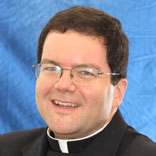Perhaps the most important question anyone can ever be asked is the one that Jesus addressed to his disciples at Caesarea Philippi, as recorded in the 16th chapter of the Gospel of Matthew: “Who do you say that I am?”
In the Person of Jesus Christ, we encounter one who is far more than merely the greatest teacher who ever lived, or even the greatest prophet who ever lived. In him, we encounter God Himself, in a manner that is absolutely unique and utterly unrepeatable in human history. Jesus is not one manifestation of God among others in human history; rather, he is God in human flesh. In Jesus Christ, God not only speaks with a human voice, but loves with a human heart, thinks with a human mind, and heals with human hands.
The Son of God does not begin to exist only when Jesus is conceived in his Mother’s womb; he exists as the Son eternally, begotten by the eternal Father “before all ages,” as the perfect expression of all that the Father is.
When we think of someone who is truly good even in our merely human experience, we notice that one of the attributes of such goodness is that the person is not locked within himself, but wishes to be in relationship with others and to do good for them. Such goodness is found, of course, in the eternal Father even before the world’s creation, and it is an expression of the divine goodness that the Father generates the Son whom he loves, and with whom he shares his own divine nature. Their unity is so profound that it finds expression in yet another divine person, the Holy Spirit.
Thus the “Word” of the Father is no mere idea encapsulating a momentary thought as human words do. The “Word” of the Father is nothing less than the Person of the Son, equal to the Father in dignity and co-eternal with him: “God from God, Light from Light” as we profess in the Creed.
It is this Person of the Son who enters human history when the Holy Spirit descends on the Virgin Mary. The conception that takes place in her womb is not the beginning of his personal existence as it is with other lives, but rather the beginning of his human life. Because the Person of the Word is coming into human flesh at this moment, Church doctrine has coined the word Incarnation (i.e., “enfleshment”) to express this unique and unrepeatable turning point.
Another term so coined, and one that is also recited in our Creed, is the word consubstantial meaning “of the same nature.” Because of his Incarnation, Jesus Christ is consubstantial with the Father in his divinity, consubstantial with us in his humanity.
Yet it is not two Persons that we encounter in him, but one divine Person living his life simultaneously in two natures that are unchanged by the union, unmixed as if to create some new reality, undivided since both belong to his one Person, and forever inseparable: It is not only during his earthly life that he remains both divine and human; even now, glorified in heaven, he continues to share our nature.
This origin of Jesus in his human nature is termed his Virginal Conception and Virgin Birth, since he is born of the Virgin Mary as the Son of the eternal Father, without the intervention of a human father.
The term Immaculate Conception, which some people inadvertently confuse with this, refers instead to another Catholic dogma, related to this one but distinct from it: namely to that special gift by which God preserved Our Lady, at her own conception in the womb of her mother St. Anne, from the stain of original sin with which all of us are born since the fall of the human race, which we examined previously. Thus prepared by God, Mary was able to say “yes” to God without reserve, and so become the Virgin Mother of God’s only Son.
Since Jesus is truly God and truly man, it has always been a hallmark of Catholic doctrine to refer to Mary as the “Mother of God.” It is not simply to honor Mary that Catholic devotion has always jealously guarded this title of hers, but rather because one cannot deny the truth of that title of hers without implicitly denying the astounding but wonderful truth that in her Son, God has truly joined the human race and become the brother of every one of us.
***
(For more, read Catechism of the Catholic Church, nn. 456-511; or United States Catholic Catechism for Adults, pp. 81-87; or Youcat, nn. 76-85)




Share this story